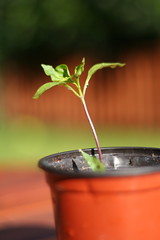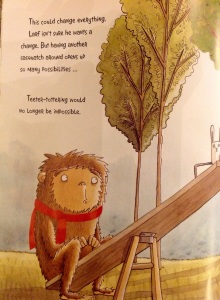Lenten season ended yesterday. This year, I gave up shame (or more specifically, internalized ableism – the self-imposed rules for not appearing disabled and feeling badly for needing help, the stories we hear about what #HighFunctioningMeans). This practice felt like praying for patience — an invitation to a universe ready to provide plenty of opportunities to be patient. I’m learning to recognize these acts of self-shaming, and resultantly have experienced meta-shame (being ashamed of shame — wishing I could just get over myself already).
My grandmother died in early February. I’ve alluded to familial grief before — the loss of abstractions I needed: safety, calm at home, routines, and people to help me label my feelings. I’ve cobbled together support systems of mental health professionals, prescribing clinicians, and a chaplain lady. Grandmother was remarkable and helped me find a security I barely knew before living with my grandparents as a high school freshman. She mothered me — another Mrs. W in a longer narrative of women who cared for me emotionally when traditional figures couldn’t.
The Friday before spring break, I found myself sitting on the floor of the School of Education, trying to calm myself (with the help of an undergrad I’d just met and proceeded to talk to/at her) and to remember what breathing deeply felt like. She was pre-med and remarkably good at staying calm when I was visibly anxious. It felt like hours; she decided to skip class to sit with me. I was apologetic. She kept reminding me that it was okay. I was okay.
Since then I’ve tried two sets of anxiety medication: First clonazepam + generic Wellbutrin, then tapered off when my therapist (Dr. W.) remembered the former led to depressive symptoms a few summers ago. The bupropion seemed to make me ragey — at ableist f-cks and people who heightened my shame.
In response, Dr. W introduced me to the psychiatric nurse practitioner (NP H.) on campus, who wrote me a prescription for buspirone (generic Buspar, a 2-3X per day anxiolytic). I left NP H’s office with a script and detailed instructions for titrating my anxiety meds. A kind undergrad passing by health services helped me reset my medication alarms. I felt simultaneously apologetic and grateful.
I’ve taken the therapeutic dose of meds for the last week-and-a-half. The buspirone seems to be helping (she said hesitantly for fear it might attack like every med before it). I’m starting to feel better — calmer, spending fewer afternoons on floors, remembering to pack my meds case and stim toys (Tangles, coloring books, notebooks, and crayons).
I’ve learned to let other people take care of me over the past few months. These experiences are terrifying. “I gave up shame for Lent” has been my refrain since this season began. Even when my supervisors at work couldn’t acknowledge that my inability to pass explained my recently poor job performance.
I gave up shame for Lent. I needed to choose myself, every bit of self-care I could practice, over perfect performance at work. I was late, overly talkative, but still very much myself — more so than usual, and people began to worry. I’ve passed well — quirky, rather than Autistic. I’m saddened and angry that passing is survival for people like me.
I wish people were more patient when I’m visibly struggling. I wanted to curse at my performance review — on giving others their time and space. What about me? My needs for time and space are ignored too, I wanted to declare. Ableist f-cks were the words I suppressed. Aloud, I spoke of getting better: I am X; I’ve tried Y; how can you help via Z. I appeared contrite — apologizing for my atypically expressed grief, Autistic social norms, and the scatteredness of anxieties. I apologized for me, for being unable to hide my struggles. Sorry, not sorry.
I’m learning to slow down to feel better, even at the expense of missed deadlines and confused looks from others. This is what managing looks like: Stimming and grounding, making meds notes to share with NP H., and talking about mental health like it’s the weather. Self-care is acknowledging my own kind of normal and letting trusted people into this narrative. My meds alarm goes off three times a day and I feel ripples of shame at my feet. I am anxious enough for meds. My friend reminds me, “Pill shaming is yet another form of internalized ableism.” I believe her.
These are the #VoldemortyThings, what shall not be named for fear of the conversations and looks that will follow. The not understanding because they have never experienced these kinds of normal. My normal. I’m grateful for those who know how to hold space for the things we would rather leave unnamed.
The baristas who listen well by nodding and saying the reassurances I am waiting to internalize. The friends who take me home after I’ve had a meltdown at the cafe. The proprietors who ask me to categorize their tea box. These are “the nuances and anomalies, the things I assume only accessorize my day.” This is how I’m coping well enough. #ThisIsWhy














